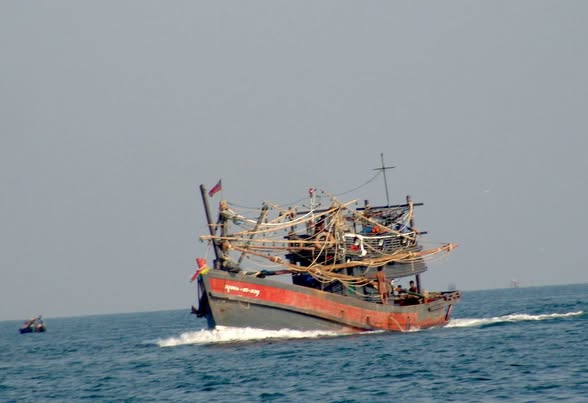In Ye Township, Mon State, authorities from the military junta’s township administration office have summoned local fishing industry operators to submit accurate lists of offshore vessels and crew members before they depart for the sea.
The move comes after a viral video in July showing abuse of workers by operators of a fishing raft sparked public attention. The township administration reportedly called operators and brokers for warnings during the first week of August, aiming to prevent similar incidents from occurring again.

Most offshore fishing laborers in Ye Township are migrant workers aged 18–40 who come from Yangon, Tanintharyi, and Ayeyarwady regions. These workers are recruited through brokers to work on rafts based in Asin, Zee Phyu Thaung, and Dhamaine Seik villages.
Because of the dangers and low pay for this type of work, it is difficult to secure workers. Raft operators rely heavily on labour brokers, who often engage in manipulation, coercion, and forced recruitment. Workers also face wage deductions, and other human rights abuses, such as trafficking, and physical punishment, resulting in occasional deaths.
Following the viral video, local sources say that authorities will conduct strict verification this month of crew registration, worker identification cards, and endorsements from village administrative offices.
“They are focusing mainly on the rafts. Previously, inspections were rare, workers could go to sea as long as they were paid. But after the raft video went viral, they said they would carry out inspections. Any raft leaving this month will be checked,” said a local source.
Authorities will also scrutinize vessels entering the coastline, along with their crews. Any discrepancies in submitted lists could lead to legal action against the vessel owners and captains.
Despite these warnings, locals report that, aside from one individual who was arrested in July in connection with the viral raft video, most brokers and operators continue their business as usual without facing substantial penalties.
“If they were serious about enforcement, it would benefit the workers. But as it stands, they aren’t arresting brokers; everything is handled through warnings and understandings. There hasn’t been any real accountability,” said a local man from Zee Phyu Thaung.
Efforts to address human rights violations in Myanmar’s offshore fishing industry have been ongoing for years. During the previous civilian government, lawmakers attempted to amend the country’s fishing laws, but those reforms were never implemented.
